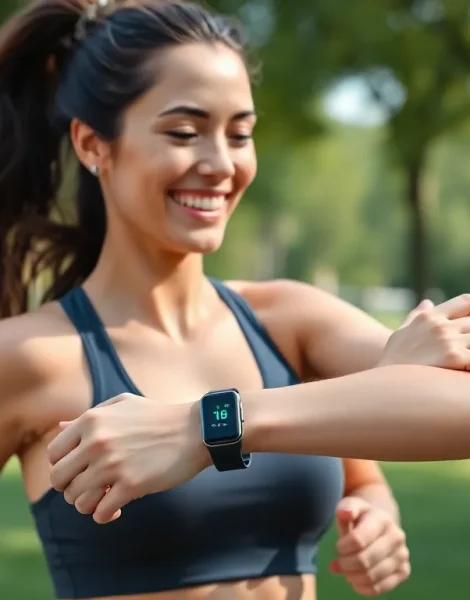In a world where couch potatoes are evolving into fitness warriors, GPS fitness trackers have become the secret weapon in this epic battle. These nifty gadgets don’t just count steps; they track every heart-pounding moment, turning mundane jogs into thrilling adventures. Imagine running through the park, feeling like a superhero, while your trusty tracker records your every move—like a loyal sidekick ready to share your epic tales of endurance.
But it’s not all about the sweat and glory. GPS fitness trackers offer insights that can transform anyone into a fitness guru overnight. From mapping out routes to monitoring heart rates, these devices are like having a personal trainer strapped to your wrist, minus the motivational yelling. So whether you’re training for a marathon or just trying to outrun that last slice of pizza, GPS fitness trackers are here to help you conquer your fitness goals with style and a chuckle.
Table of Contents
ToggleOverview of GPS Fitness Trackers
GPS fitness trackers are innovative devices enhancing the fitness experience for users. These gadgets go beyond simple step counting; they provide real-time location data, accurate pace tracking, and distance measurement. Monitoring heart rates is another notable feature, giving insights into workout intensity.
Data collection is vital for progress tracking. Many fitness trackers sync seamlessly with smartphones and apps, allowing users to analyze their performance over time. This capability helps establish trends and set future goals based on past achievements.
Integrating GPS technology adds a unique dimension to workouts. Users can map their routes, explore new areas, and keep track of elevation changes, improving outdoor activities such as running and cycling. Knowing one’s exact location enhances safety during solo workouts.
Varied features cater to different fitness levels. Some trackers focus on advanced metrics, such as VO2 max and recovery time, while others offer basic information for casual users. Each feature can motivate users to stay active and engaged.
Consideration of design and usability matters. Many GPS fitness trackers feature sleek, lightweight designs for comfort during workouts. Battery life varies, with some lasting multiple days, making them suitable for extended outdoor adventures.
GPS fitness trackers serve as essential companions for anyone looking to lead an active lifestyle. Their multifaceted roles in fitness not only promote exercise but also equip users with valuable data to achieve personal health goals.
Key Features to Consider

GPS fitness trackers come with a variety of features that enhance workout experiences and data tracking. Understanding these key aspects helps users make informed choices.
Accuracy and Performance
Accuracy determines how effectively a tracker measures distance, pace, and heart rate. High-quality GPS technology ensures data precision, which is essential for serious athletes and casual users alike. Many fitness trackers utilize advanced algorithms to enhance performance metrics, analyzing data in real time. Comparing multiple trackers based on their accuracy ratings aids users in selecting the right device. Users often appreciate those offering both satellite and wrist-based heart rate monitoring for added reliability.
Battery Life and Durability
Battery life plays a crucial role in determining how frequently a tracker requires charging. Many devices offer several days to weeks of usage, depending on features like GPS tracking frequency and screen brightness. Durability also matters; robust materials resist water and impact, making trackers suitable for various environments. Some options feature water-resistant designs for swimming and other water activities. Selecting a device with an optimal balance of battery longevity and ruggedness extends usability during outdoor adventures.
Compatibility with Other Devices
Compatibility enhances the user experience by allowing seamless integration with smartphones and apps. Most fitness trackers sync easily with popular health platforms, enabling comprehensive performance analysis. This connection often provides personalized insights and goal-setting options. Investigating compatibility features ensures users can utilize their tracker alongside existing devices effectively. Some trackers even support third-party apps, widening their functionality and providing additional metrics.
Popular GPS Fitness Trackers on the Market
Various GPS fitness trackers cater to specific activities, enhancing performance for athletes and recreational users alike. Here’s a look at some options tailored to distinct fitness needs.
Trackers for Runners
For runners, devices like the Garmin Forerunner series deliver precise pace and distance tracking. These trackers often include advanced features, such as heart rate monitors and training plans. Accuracy ensures that every step counts, helping runners fine-tune their workouts. Users appreciate the lightweight designs and comfortable fit, perfect for long runs. Additionally, many models offer interval training and route mapping to keep sessions engaging. Enhanced GPS technology allows real-time feedback, motivating users to reach personal records.
Trackers for Cyclists
Cyclists often choose models like the Wahoo ELEMNT series that offer built-in GPS and connectivity options. Performance-related features, including cadence sensors and speed tracking, cater specifically to biking needs. Durability stands out, with many devices designed to withstand tough outdoor conditions. Cyclists benefit from easy navigation and route planning features, enhancing their exploration of new trails. The user-friendly interfaces allow for quick access to metrics, making it effortless to stay focused on the ride. Integrated smartphone notifications also provide seamless communication while cycling.
Multi-Sport Trackers
For multi-sport enthusiasts, devices such as the Suunto Ambit series offer versatility across various activities. These trackers typically support running, cycling, swimming, and more, catering to users who engage in different sports. Features like customizable sport modes and transition tracking enhance training sessions. Users value the ability to monitor performance metrics across diverse activities, streamlining progress tracking. Robust designs ensure reliability in various environments, while battery life often supports extended workouts. Integration with apps provides insights into overall fitness and wellness, benefiting users with comprehensive training data.
Benefits of Using GPS Fitness Trackers
GPS fitness trackers offer numerous advantages that enhance users’ fitness journeys. These devices help individuals monitor their progress effectively.
Enhanced Performance Tracking
Enhanced performance tracking remains one of the standout features of GPS fitness trackers. Users can access real-time data on pace, distance, and speed, facilitating informed adjustments during workouts. Accurate heart rate monitoring complements this data, allowing for tailored training intensities. Many trackers utilize advanced GPS technology, significantly improving route mapping accuracy. This accuracy verifies that users can explore new paths without confusion. Performance analytics provided in accompanying apps helps users track long-term trends and visualize progress. These insights empower individuals to refine their training strategies based on actionable data.
Motivation and Goal Setting
Motivation and goal setting thrive through the use of GPS fitness trackers. Users can easily set specific, measurable goals, such as distance achievements or calorie burning targets. Visual progress tracking showcases achievements and keeps motivation levels high. Many devices come equipped with reminders and alerts that encourage users to stay active throughout the day. Friendly competition features, like sharing stats with friends, enhance social engagement and accountability. The sense of accomplishment from meeting goals encourages consistency. Over time, this reinforces healthy habits and promotes an active lifestyle.
GPS fitness trackers have transformed the way individuals approach their fitness journeys. By providing real-time data and personalized insights, these devices empower users to stay motivated and track their progress effectively. Whether someone is a seasoned athlete or just starting out, the right tracker can make a significant difference in achieving fitness goals.
With a variety of features tailored to different activities and fitness levels, there’s a GPS fitness tracker for everyone. The blend of technology and usability ensures that users can enjoy an engaging workout experience while remaining focused on their health aspirations. As more people embrace active lifestyles, GPS fitness trackers are set to become indispensable tools for fitness enthusiasts everywhere.









